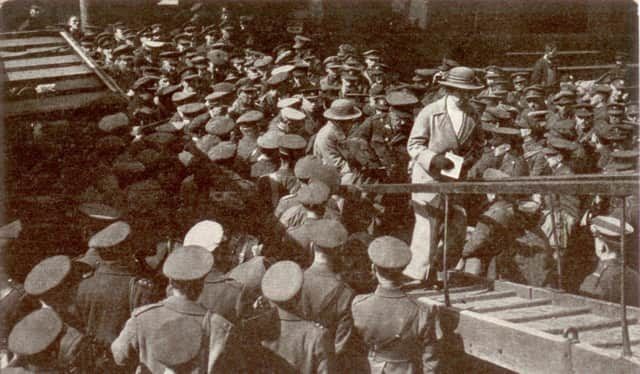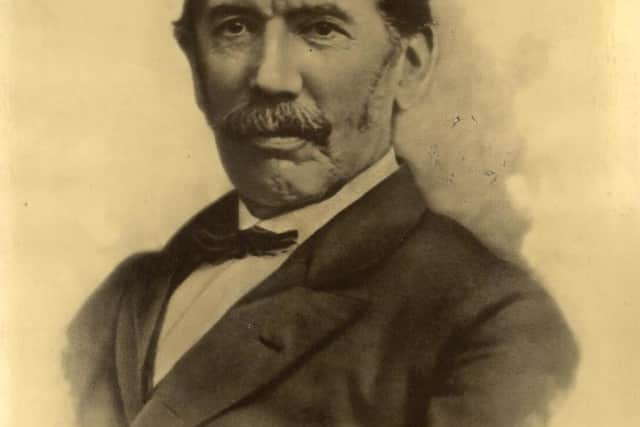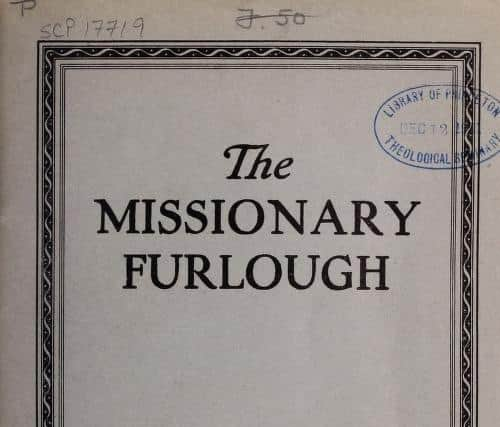The many trials and tribulations of furloughing missionaries in time past


It probably dates from the 1600s, but by the 1800s a soldier on home-leave was ‘on furlough’.
More recently the terminology acquired legal connotations, for convicts on parole or probation or on work release from prisons.
Advertisement
Hide AdAdvertisement
Hide AdThere was a reference here to the Whoopi Goldberg film about a female prisoner ‘getting furlough’ to visit her ailing mother, and to an old WWI postcard showed troops boarding a ‘military furlough ship’.


But the most common use of furloughing was in missionary work.
Since at least the early 1800s missionaries took 12 or 15 months off every four of five years to come home from foreign lands on a ‘working holiday’ called a furlough.
They went on speaking tours around their home-churches to raise interest and funds, which was how one of history’s best- known missionaries, Dr David Livingston, was initially enthused to go to Africa.
Advertisement
Hide AdAdvertisement
Hide AdSome intriguing extracts from an old 1921 Presbyterian Furlough Manual were shared on this page a few weeks ago, and I promised to return to it again.


It was compiled by the cumbersomely-named Board of Missionary Preparation of the Foreign Missions Conference of North America, one of dozens of booklets and pamphlets issued to would-be missionaries explaining the “presentation of Christianity to people of other religions” including Hindus, Moslems, Buddhists and other ‘primitive peoples’.
I’ve already perused the first two chapters on ‘Physical Reinvigoration’ and ‘Mental Upbuilding’.
The next chapter on ‘Spiritual Stimulus’ begins “no missionary fails to crave the opportunity to make his furlough count in gaining a fresh intellectual and spiritual viewpoint or a clearer apprehension of many of the religious problems which he may have to face in his public ministry or in private interviews.”
Advertisement
Hide AdAdvertisement
Hide AdFurlough, for missionaries of yore, was a hugely significant experience.


They’d often been working in distant lands for very lengthy periods.
By the mid-1900s missionaries took 12 or 15 months off every four of five years to come home, but prior to that they spent much longer away from home.
The chapter entitled ‘Contact with the Homeland’ outlined the effects of this lengthy separation.
Advertisement
Hide AdAdvertisement
Hide Ad“An earnest missionary is in a very real sense in danger of expatriation…he needs a furlough in order that he may not lose an essential social contact with his home base. He needs to renew family ties, to continue old friendships and to make new affiliations…”
The manual explains “a busy missionary lives a day at a time.
He is dangerously prone to absorption in the interests of his small district or of his country. He is cramped by innumerable petty details, narrow streets, unresponsive people, sometimes by a hostile or depressing atmosphere.”
At home on furlough the missionary is “set free from the engrossing claims of his station, or of his department of work, or of his immediate task, and he will be able to survey dispassionately the years of his own active service.”
Advertisement
Hide AdAdvertisement
Hide AdAccording to the manual, furloughs for the Presbyterian church’s first missionaries “though not unknown, were relatively rare. As conditions of travel improved they came to be planned at ten year intervals. Gradually the length of standard terms of service in the field has been reduced until today (1921) for missionaries working in temperate zones a period of seven years has been recognized as the average furlough term, while for fields lying within the tropics or in countries presenting conditions of unusual hazard and strain, the term has been placed at from five to three years.”
After such long periods in foreign lands, working long hours in often difficult terrain and inclement weather conditions, furlough generally lasted from 12 to 15 months “several months, at least, being allowed for strictly personal use. For missionaries to tropical, debilitating regions, furlough arrangements have to be adjustable.”
While missionary pay and allowances during furlough “deserves thoughtful consideration” the manual notes that “there has been a marked increase in living costs of every sort in recent years, applying particularly to the conditions amid which the missionary and his family must live, but also there are expenditures, often quite essential, which are sometimes overlooked.”
While working in foreign lands the missionary and his family are provided with a home.
Advertisement
Hide AdAdvertisement
Hide AdThe manual suggests “during the furlough, a house or a fair rooming allowance is equally necessary.”
But very few luxuries were financed, even to cover “such minor expenses as postage, stationery and telegrams…few missionaries feel able to buy books and magazines or to attend lectures and concerts. Yet these matters are important.”
The manual stresses that lack of finances will worry missionaries on furlough but admits “many missionaries worry so much that they fail to recuperate properly. They feel unable to attend inspirational meetings, or to undertake educational courses, because of the added expense. Such inability bears very heavily on the wife and mother. These restrictions are both unwise and unjust. A missionary occasionally goes back to his field with debts.”
The chapter ends on a sobering note: “one whose name is honoured in missionary circles once declared that his first furlough cost him almost twice his allowance, and the second one almost four times as much.”
A message from the Editor:
Advertisement
Hide AdAdvertisement
Hide AdThank you for reading this story on our website. While I have your attention, I also have an important request to make of you.
In order for us to continue to provide high quality and trusted local news on this free-to-read site, I am asking you to also please purchase a copy of our newspaper whenever you are able to do so.
Our journalists are highly trained and our content is independently regulated by IPSO to some of the most rigorous standards in the world. But being your eyes and ears comes at a price. So we need your support more than ever to buy our newspapers during this crisis.
With the coronavirus lockdown having a major impact on many of our local valued advertisers - and consequently the advertising that we receive - we are more reliant than ever on you helping us to provide you with news and information by buying a copy of our newspaper when you can safely.
Advertisement
Hide AdAdvertisement
Hide AdYou can also enjoy unlimited access to the best news from across Northern Ireland and the UK by subscribing to newsletter.co.uk
With a digital subscription, you can read more than five articles, see fewer ads, enjoy faster load times, and get access to exclusive newsletters and content. Visit https://www.newsletter.co.uk/subscriptions now to sign up.
Thank you